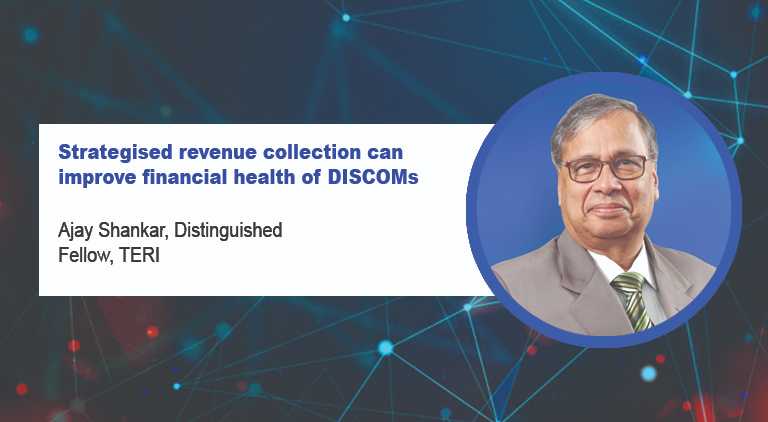Strategised revenue collection can improve financial health of DISCOMs
By EPR Magazine Editorial February 27, 2021 11:51 pm IST
By EPR Magazine Editorial February 27, 2021 11:51 pm IST

Ajay Shankar, Distinguished Fellow, TERI in a discussion with EPR Magazine, talks about stabilising the finances of DISCOMs and GENCOs that till the distribution sector is fixed both financially and technically, the situation for the consumer would not be satisfactory.
Government is focusing more towards efficient power generation and distribution
The focus on supply of electricity is a prerequisite today. India has now achieved enormous success in providing electricity to all households, in course of the 12 years. It also has for the moment adequate generation capacity, and is planning to augment it even more in the future. The real challenge of the government is to ensure that all the households get reliable and quality power supply. This itself is a major challenge as it needs improvement in distribution network and carrying capacity. However, most of the distribution companies in India are financially weak. So, the gap between the average cost of supply and average revenue earning per unit is unexpectedly high. Till we can fix the distribution sector both financially and technically, the situation for the consumer would not be satisfactory. So, for the financial health of the sector, it is highly imperative that the financial health of the distribution which is the part of the supply chain wherein you collect revenue from the consumers is set right.
Outstanding dues of GENCOs and DISCOMS are high. Would this move to shift focus towards power supply bring any relief to the debts?
The real challenge is to collect enough from the consumers so as to pay the generators. This means to eliminate the gap between revenue collected per unit and cost per unit and also have bit of a surplus to be able to invest in distribution network. To achieve this there are two ways of doing it, first is to increase the tariff and second is to reduce AT&C losses so that you collect as much as revenue possible without leakage of electricity nor non-payment for consumption of electricity. This challenge varies state to state. So, I think the ideal approach would be for the Central Government or its agencies is to focus state by state and try to work out, how a turnaround can be brought up in each state.
Policy support for improved operations in power?
One thing that the Power Minister is emphasising for quite some time is to move towards prepaid meters. So, when you look at the telecom sector with prepaid meters, the private companies have no issues when it comes to revenue collection. Now, the same kind of technology which is sensor-based meters, payment remote disconnection, etc. can be made possible. So, if you move towards prepaid meters, it becomes easily possible to make sure that every unit of electricity consumed is paid for.
Dealing with issues like Cyber threat in power sector
Cyber-attacks are a big issue, not just for our country but also for the whole world. First thing is that the government and the people who work with the grids need to work together to bring in the latest technologies for protecting themselves from cyber-attacks. The other area where work is required is to ensure robust recovery ability, so that in case of a black out or a cyber-attack and the grid collapse, we need to bring the grid back to functioning very quickly and also have processes in place that would restore the power supply at least in sensitive areas or installations as quickly as possible.
Infrastructural requirement for efficient power supply
Essentially, the transmission and distribution network should have a carrying capacity which should be in excess of current demand and current demand has to keep on rising because the per capita consumptions need to be doubled or tripled. The infrastructure should be ahead of demand, so that robust quality supply is ensured for every consumer. These kinds of achievements are seen in Mumbai and Delhi where the carrying capacity is good enough as there is sudden rise of peak demand of because of high temperature and weather conditions; the network is not under stress.
__________________________________________________
I think the ideal approach would be for the Central Government or its agencies is to focus state by state and try to work out, how a turnaround can be brought up in each state.
Ajay Shankar, Distinguished Fellow, TERI
We use cookies to personalize your experience. By continuing to visit this website you agree to our Terms & Conditions, Privacy Policy and Cookie Policy.